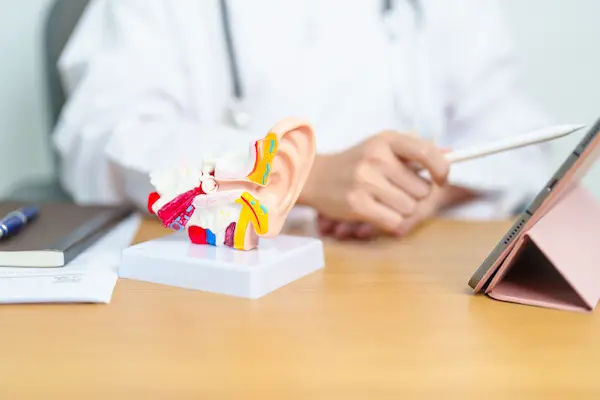- Female
- 30 Years
- 14/08/2025
my nose feels blocked all the time and the doctor said I have turbinate hypertrophy can this be treated without surgery what medicines would help reduce the swelling
Answered by 1 Apollo Doctors
Turbinate hypertrophy can improve with nasal steroids and antihistamines. Persistent cases may need turbinate reduction surgery.
Dr. Dhankecha Suggests...
Consult a Ent Specialist
Answered 14/08/2025
0
0

More ENT Health Queries
View allI've had inferior and middle turbinate issues along with a deviated nasal septum for the past 13 years. I'm 22 now and experience nasal blockage at night sometimes in the right nostril, sometimes the left, but never both at once. My sleep is fine though. Should I consider surgery or just live with it? What type of surgery would you recommend, and will I be able to live normally afterward?
for P/E ENT specialist opinion is advised to the patient.
Answered by 1 Apollo Doctors
Can anyone recommend a good doctor for eardrum endoscopy surgery in Karnataka or Mangalore I need someone experienced and a reliable hospital for the procedure
For eardrum endoscopy surgery in Karnataka or Mangalore, consider seeking expertise at Manipal Hospitals, Dr. Deviprasad D at Manipal Hospitals or Mangala Hospital. Also, look into the ENT departments of Apollo Hospitals and Gleneagles Hospitals for their endoscopic ear surgery capabilities.
Answered by 1 Apollo Doctors
I'm really worried about this sensation of something stuck in my throat that's been bothering me for the last three months. At first, there was this heaviness near my throat, but thankfully that's gotten better. Whats weird is the problem of feeling like there's something there just won't go away. Earlier, I also had a burping issue, but thats stopped now. I should mention I used to smoke and have quit since March when these throat issues started. Any idea what could be going on?
Your persistent sensation of something stuck in your throat, despite improvement in heaviness, could be related to acid reflux, gastroesophageal reflux disease (GERD), or a throat irritation; quitting smoking is a positive step, but consider consulting an ear, nose, and throat (ENT) specialist or a gastroenterologist to rule out underlying conditions, such as a throat polyp, inflammation, or esophageal narrowing, and to discuss further diagnostic tests like endoscopy or imaging studies.
Answered by 1 Apollo Doctors
Disclaimer: Answers on Apollo 247 are not intended to replace your doctor advice. Always seek help of a professional doctor in case of an medical emergency or ailment.





